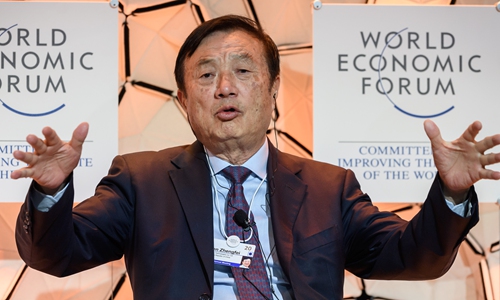HOME >> CHINA
Chinese official vows support for globalization at Davos
By Xie Jun and Qi Xijia Source:Global Times Published: 2020/1/21 23:33:40
Global elites to call for a fairer, more open world order against protectionism: expert

Huawei CEO Ren Zhengfei speaks at the Congress center during the World Economic Forum (WEF) annual meeting in Davos, on Tuesday. Ren said the company is "confident" that it can "survive even further attacks" in 2020. Photo: AFP
Discussions on how to bring the world economy back to the track of globalization is expected in the next few days in the Swiss mountain town of Davos, as world elites gather at the World Economic Forum (WEF)'s annual meeting to give their thoughts on world development in the face of mounting economic and social challenges, Chinese economists predicted on Tuesday.In a special address on Tuesday afternoon at the forum, Chinese Vice Premier Han Zheng reiterated China's firm support for economic globalization and called for global collaboration to tackle world's biggest challenges, including poverty, climate change, and environmental protection.
"Unilateral and protectionist practices which run counter to the global trend will lead nowhere," Han said, adding that China will continue to open its doors to the world. "Despite the protectionist and unilateral moves by some countries, China will not stop opening up and we will not follow their footsteps to move in the opposite direction.
Thousands of political leaders, business executives, scholars and celebrities will attend the meeting, which begins on Tuesday and ends on Friday, to discuss a range of topics on the theme of "Stakeholders for a cohesive and sustainable world", the WEF official website said.
The meeting's theme, which highlights cooperation, shows that the world is increasingly aware of the importance of globalization, at a time when global economic growth and the future of multilateralism face growing challenges amid rising protectionism, experts said.
"Through the topics, the global elites will call for the construction of a more cooperative, fairer, more open and inclusive world order, instead of retreating back to protectionism," Wang Jun, deputy director of the department of information at the China Center for International Economic Exchanges in Beijing, told the Global Times on Tuesday.
Those discussions are of special significance at such a "complicated" and "difficult" time when many countries are troubled by economy-wrecking de-globalization measures, he noted.
The World Bank has downgraded its global growth forecast for 2020 by 0.2 percentage points to 2.5 percent.
Cong Yi, a professor at the Tianjin University of Finance and Economics, predicted that the discussions might focus on the new framework for the global governance structure in the process of globalization, developing countries' demands for peaceful development environment, and trade frictions, especially the US-China trade war.
Economists stressed that Chinese President Xi Jinping's keynote speech at the WEF annual meeting in 2017, which emphasized that no one will emerge as a winner in a trade war, is very "far-sighted" and "forward-looking."
"More importantly, Xi has directly made China's choice known to the world - that the country will stand with globalization. This attitude has injected confidence into the world economy," Song Guoyou, director of the Fudan University's Center for Economic Diplomacy, told the Global Times.
Trade deal a hot topic
Chinese economists also predicted that the China-US trade war, which recently made significant progress by signing the phase one deal, would figure prominently at the 2020 Davos forum.
"Participants are likely to speak highly of the phase one deal, while expressing their hope that China and the US can move on to the phase two deal through negotiations," Song told the Global Times.
In his speech at Davos on Tuesday, US President Donald Trump highlighted the trade deal with China and another with Canada and Mexico, despite the fact that the tariff war his administration launched has dealt a heavy blow to the global economy.
Wang predicted that trade war-related discussions will surely be held at the Davos meeting, considering that the US and China are the world's two largest economies, and that the two countries had just signed an agreement that sent positive signs to the markets.
"Signing the trade deal will largely boost market confidence while stabilizing expectations for trade and investment prospects. This will help drive up the global economy," Wang noted.
"Talks will unlikely extend to the phase two deal at this time."
RELATED ARTICLES:
Posted in: DIPLOMACY